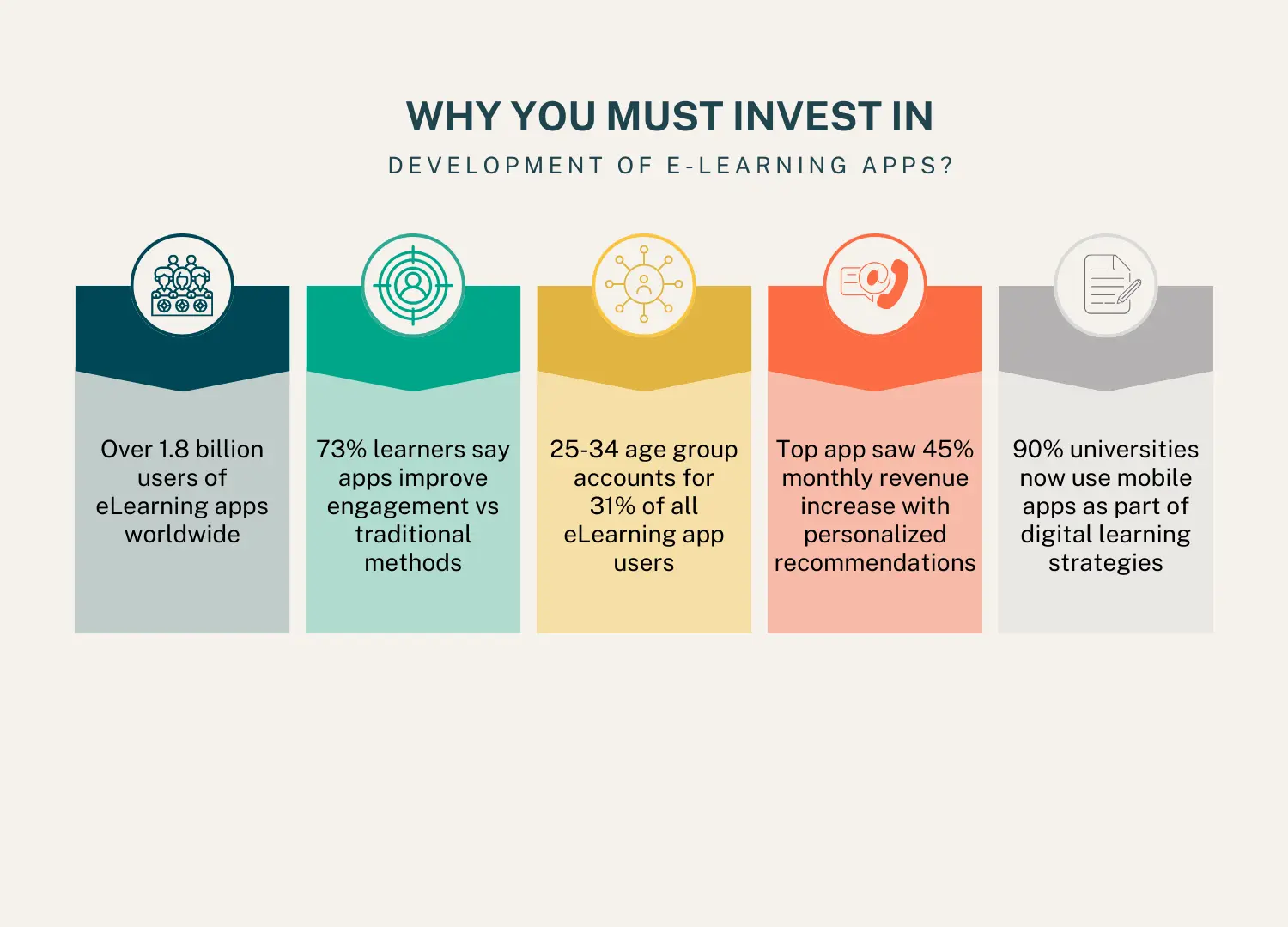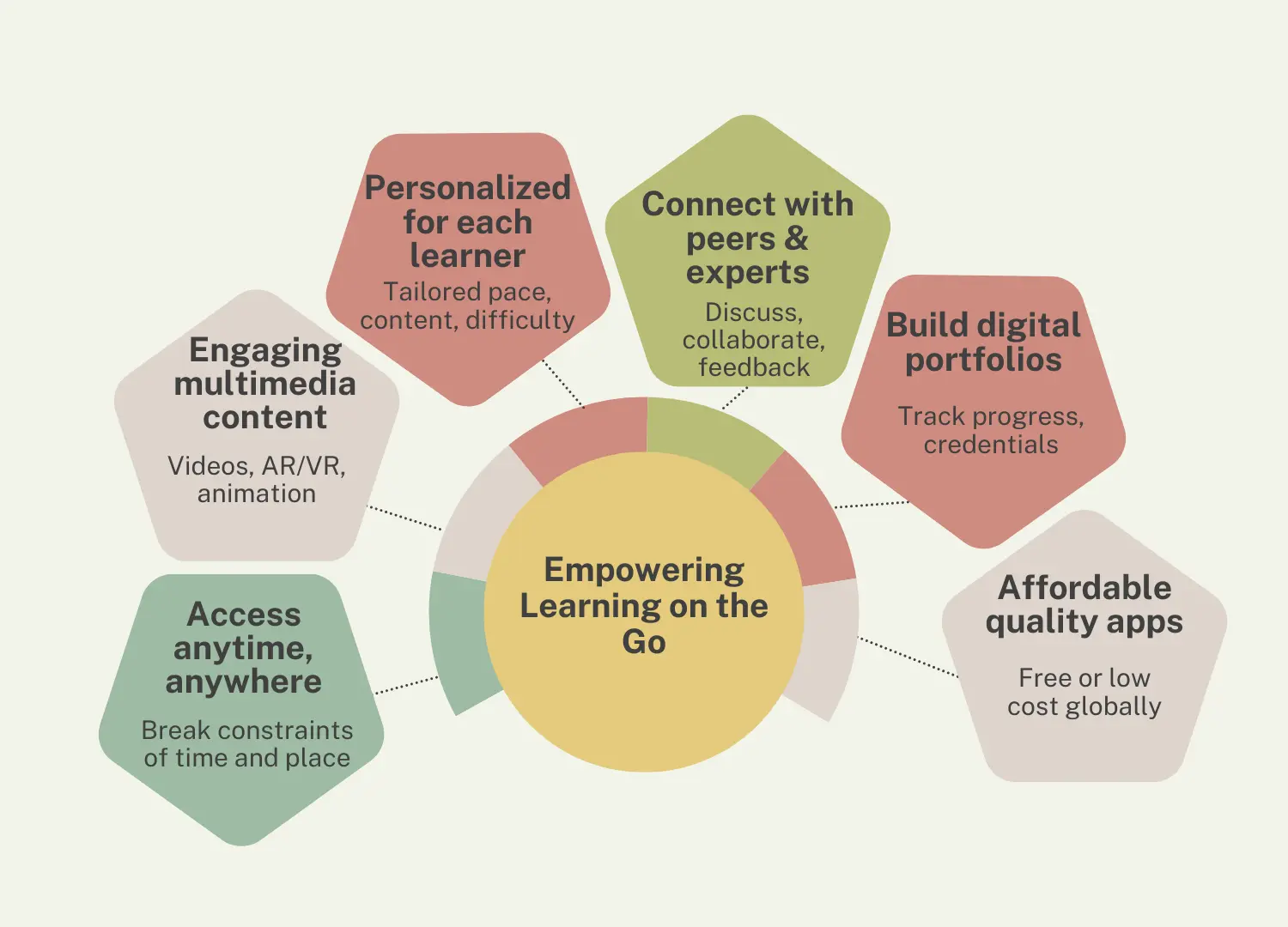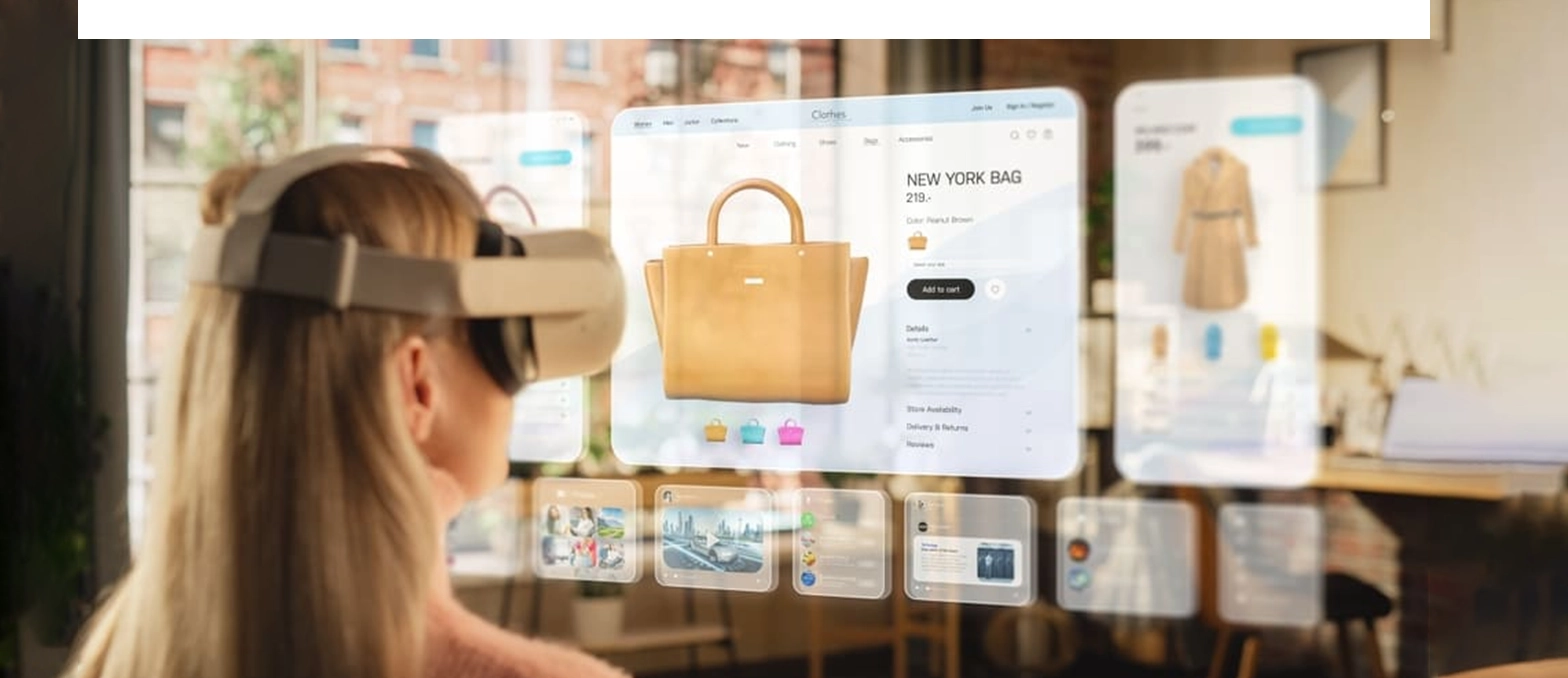Table of Contents
Mobile technology is the biggest revolution that the world has witnessed. It has turned our lives upside down, for good and bad but primarily for the former. Now, our routines are more organized, sorted, easy, and smooth, thanks to some brilliant applications that our whole world has wrapped up on our smartphones. As per the top education app development company, These online platforms are helping users hone their skills, learn new activities, and indulge in something productive. Rather than distracting young minds from their studies, these e-learning mobile apps are mentoring students with online courses and classes.
With the evolution of mobile app development services, proficient converted phones into virtual classrooms where students can be a part of curricular activities, and interesting sessions and get connected with experts.
Moreover, these online classes are more interesting, interactive, and engaging than traditional ones. As per the reports, the eLearning market is likely to cross 1,124.79 billion USD by 2030.
Every major business today seems interested in building powerful e-learning software solutions like eLearning mobile apps. We have compiled a list of 15+ educational applications that are not only guiding scholars through their studies but have also inspired startups and businesses to try their hands at something creative. Here we go:
If you’re looking for good essay writers to help with your academic tasks, you can find trusted professionals at EssayHub.

1. Khan Academy
We all are familiar with how expensive education can be. Thanks to Khan Academy, you can learn common subjects, such as math, economics, science, English, Biology, and many others without shelling out. Yes, this one of the top mobile learning apps is free to download on your smartphone without any hidden charges. For all the curious minds around the world, this application boasts over 10,000 video tutorials combined with various courses and lessons. Whether you want to brush up an old concept or plan to learn something new, it has got your back. There are online courses as well for standardized tests like SAT, LSAT, MCAT, etc., in multiple languages along with practice exercises and a dashboard to track your progress.
2. Duolingo
As exciting as it is to learn a new language, there is no denying the fact that it also demands patience and practice. If you can’t get your hands on effective and engaging learning techniques, you can lose your interest and focus in a few seconds. The mini-games feature integrated with Duolingo e-Learning app makes the app engaging. You can choose from about 30 languages, including Mandarin, French, English, Latin, Spanish, and whatnot and each class is for 5 minutes on average. The sessions start with simple picture labelling games and with each level, you are involved in innovative games to hone your grammar and vocabulary. You have daily goals and can also keep an eye on your performance to gain more XPs that open gates to interactive stories to work on your listening and reading comprehension.
3. Google Classroom
Going to an educational institute, completing daily homework or assignments, submitting them within the deadlines, and then waiting for the grades. This all seems so normal for students and is a part of their daily routine. Even teachers have gotten accustomed to reviewing and grading assignments but this process is not easy at all and can get on your nerves at times.
So, Google Classroom has come up with a perfect solution to streamline this procedure. It is a virtual classroom that can be used to send announcements, start discussions, create classes, submit assignments, review and grade them, share resources, and give feedback. Teachers simply need to share code with students so they can join the class and the rest is a cakewalk. It also helps reduce the burden of last-minute requests like do my PowerPoint presentation by offering a structured environment where tasks and deadlines are clearly organized. If you are also planning to launch your app like this, you can simply look for Android application development companies and select the one to assist you in creating one for your business that suits your budget and requirements.
4. Photomath
What is the one subject that gives sleepless nights to students? No prize for guessing, it’s Mathematics. Solving basic math problems is a nightmare for many scholars, let alone mastering it. But not anymore as Photomath brings to you a convenient way to solve complex math problems. As the name suggests, this app is focused on mathematics, which assists you as a buddy in solving the questions and even explaining the solutions.
The primary reason that makes it one of the best and most popular Android educational apps is its OCR technology. You have to take a picture of the question and the app will give the step-by-step procedure to the answer. Moreover, it also breaks down multiple problem-solving methods along with animated instructions so that you don’t mug up the answers but understand the principles.
5. Udemy
Here is a learning app that takes online education technology a notch higher than traditional courses. It goes beyond those common subjects and offers classes to polish your skills in science & technology, banking, foreign language, designing, cooking, yoga, drawing, marketing, and more. There are almost 130,000 video tutorials for 32,000 courses that cover a gamut of industries and sectors. You can learn about software programming, music, photography, writing, fitness, and more at your own pace and raise your query whenever you feel stuck. Many companies are trying to scale in the market by creating similar elearning apps like Udmey. The application Promotes open discussions with expert instructors, making online classes interactive and interesting. Although most of the courses are free, you might have to pay a reasonable amount for some selective classes.
6. edX
Every aspirant has a dream to study in a leading university like Oxford, Harvard, Columbia, MIT, etc. However, getting admission in any of them is a tough row to hoe. So, why not bring these universities to your phone and get access to their courses at one destination? Yes, with edX, one can achieve the dream of studying in the top universities as this app offers the courses of these colleges. There are courses for business studies, computer science, engineering, psychology, linguistics, statistics, and more. This Learning Management System software provides learners with professional certificates and university credits that add to a professional career. Planning to step into this field?
Get the right custom LMS development company to craft and market your app. Then connect with our experts who are adept at providing educational e-learning solutions with features like interactive quizzes, video lectures, assignment reviews, and whatnot.
7. SoloLearn
There are only a few applications that are dedicated to coding and programming languages and one of them is SoloLearn. This is a paradise for coding enthusiasts with an immense collection of specialized sessions, such as Python, C++, Java, CSS, SQL, PHP, Swift, and many others. Now, students don’t have to worry about finding reliable classes, just install this app, get registered, and join the course. This app has raised a bar for e-learning apps considering the smooth navigation and features like a mobile code editor and interactive community that it offers.
8. SkillShare
Skillshare is a popular eLearning solutions platform with a large library of video classes on creative and entrepreneurial skills taught by industry experts. Their custom mobile app allows browsing thousands of online courses on photography, design, programming, etc on any device. The courses focus on hands-on projects and are generally short in format (under 60 minutes) for convenient learning in spare time. Learners can comment, ask questions, and form online communities. Subscription plans start at $8/month and support the teachers. The app helps discover new skills while being exposed to the works of other creatives.
9. Fliplearn
Fliplearn provides micro-learning content designed for on-the-go learners through its engaging mobile app developed using cross-platform mobile app development. It offers short lessons in bite-sized 3-5 minute chunks on topics ranging from coding to productivity to photography. The lessons are delivered through a mix of text, images, and micro-videos in a snackable format ideal for learning during small breaks in daily busy schedules. The content is regularly updated and personalized too. Users can track progress through achievements and test comprehension via built-in quizzes. The app aims to instill new skills and knowledge through its highly portable and adaptive learning experience.
10. Evernote
Evernote is a very powerful note-taking app developed by an enterprise mobile application development company. Its eLearning capabilities let users store all study/course materials, notes, bookmarks, to-do lists, flashcards, etc. in a centralized place accessible across all platforms. The eLearning features allow importing files, web clipping, and audio notes and also offer note-sharing groups. Learning becomes highly organized as notes can be tagged, arranged in notebooks, and searched instantly. Revision is simplified through reminders and checklist functions. The premium subscription offers additional benefits like increased upload limits and integration with other apps and services. Overall, it helps learners be more productive during self-paced learning journeys.
Other Scaling Mobile Learning Apps to Consider
Today’s IT consulting service providers understand the upcoming need for a dedicated learning platform that also fits the cultural and business needs of an organization.
The scalability and the need for e-learning apps can be seen amid pandemics as per the top elearning app development company.
Hence, here are a few more dedicated e-learning platforms that offer diverse courses, focusing on different age groups.
11. Lumosity
A personalized brain training app that promises to enhance your focus, improve your memory, and make your brain sharper. This app is integrated with games to exercise your mind and keep it healthy every day. Unlike any other learning app, Lumosity is integrated with cognitive learning technology, which is a part of artificial intelligence services & solutions. This level of technology integration enables the app to differentiate between the age groups of different users while adapting their unique strengths and weaknesses for assigning tasks to progress each day.
12. StudyBlue
Today’s e-Learning solutions are made with a mobile-first approach to be responsive. Hence more and more hybrid application apps are in demand. StudyBlue is a great example of an online hybrid e-learning solution that can work on any device. Hence, you always get the freedom to learn from anywhere and anytime.
Whatever your vertical or choice of subject is, StudyBlue can help you with anything. The company has segregated study materials into three different categories – by college, by high school, and by country. All the study material categories can be found through flashcards. The customized flashcard allows you to create your own to remember the relevant course and test with other flashcards.
13. Skill Pill
The smart and the most engaging way to learn, Skill Pill is a leading high-quality digital learning platform to upskill the organization’s team. Whether it is essential soft skills or cultural workspace management, Skill Pill is a versatile approach to fresh and modern learning.
Skill Pill boasts of offering the best content library straight from the bestseller business owners, such as Pearson, Financial Times, and Kogan Page. So you get to learn from a wide variety of courses, such as management & strategy, graduate pack, work skills, micro MBA, and technical and soft skills. Skill Pill offers skills requisite for Microsoft Office, AWS consultants, and to deliver Google cloud computing services.
14. BoostHQ
A perfect knowledge-sharing platform for the organization to scale its remote workforce. BoostHQ is a true example of the new improved learning content management system offering a wide array of features, such as knowledge sharing, content organization, employee discussions, analytics & feedback. BoostHQ offers a centralized resource library with useful material that allows organizations to share them in the form of PDFs, text, images, or videos.
You can easily create a learning community to exchange ideas and thoughts to identify knowledge gaps and cover them with proper training. Get reports and analytics of insights and organize your files with tagging and search features for easy accessibility.
15. DesignJot
This is the first paid iPad app for training professionals to integrate better training. This app is for beginner-level training. The application allows beginner designers to create or customize the templates available for initial learning. They can use Word, spreadsheets, presentations, and mind-mapping tools to serve them better. This helps in continuous learning and implementing them in real-time situations.
16. Educreation
A recommended e-learning window for clear and consistent collaboration of students with teachers. Learners are opportune to learn their course material with the help of interactive dynamic videos created by their teachers. Learners can learn at their own pace, which traditional learning methods do not permit. With the help of SaaS development services, education can let its users access content from any platform, share content on social media, and safely store content in the cloud for future learning. The unique interactive board and screencasting tools offer an extensive learning experience. You can download this app for free and start new learning experiences.
17. Animoto
Just like any video streaming app, Animoto has leveraged the power of video and created software integrated with videos for better learning experiences. Learn how to create a video for marketing purposes with the help of this easy-to-use tool. This software is more inclined towards marketing schools, where students learn to create promotional videos, newsletters, fundraising videos, etc. Moreover, this e-learning application is useful in creating videos for training purposes, assigning projects, and making important bulletins.
18. Thinglink
An award-winning e-learning platform for students and teachers dedicated to offering the best learning experiences ever. Thinglink integrates with reading tools, virtual tours, videos, images, and language preferences (over 60 languages) that offer a comprehensive reach. It creates visual learning experiences like never before. Thinglink assists its learners to become fluent in using multiple forms of media and express themselves. This learning experience platform is quite responsive, supporting all kinds of operating systems while giving a 360-degree interactive view. This helps in contextual understanding, and academic vocabulary, and develops skills in remote locations, work environments, and even in social situations.
How eLearning Apps Can Make A Difference?
With the advancement in technology, eLearning mobile apps have revolutionized the way people learn today. Top mobile app development companies in the USA are continuously developing innovative eLearning apps that not only make learning simple and fun but also help learners stay engaged for longer. These mobile application consulting services use the power of gamification and personalized learning to address the evolving needs of modern learners from all generations and backgrounds.
There are a few key ways in which custom mobile app development services have helped transform the learning landscape:

Accessible on-the-go Learning
One of the biggest advantages of iOS app development companies and Android app development companies is that they allow learners to access educational content anywhere, anytime on their mobile devices. This flexible and portable nature of mobile learning breaks the constraints of time and place for education. Learners can learn even during their commute, in waiting areas, or spare moments.
Interactive and Engaging Content
eLearning Development Companies in the USA are using multimedia like videos, AR/VR, animation, etc to develop highly interactive and engaging content within the best eLearning mobile apps. This keeps learners interested for longer periods through gamification techniques, interactive quizzes, and challenges. The hands-on nature of content on mobile makes abstract concepts easier to understand.
Personalized Learning Experience
Through analytics of user data, mobile apps can offer personalized and adaptive learning. The learning pace, content, and difficulty level can be tailored according to each learner’s profile, skills, progress, etc. This self-paced customizable experience boosts the confidence and motivation of learners.
Social Learning Opportunities
Many eLearning apps promote social features that allow learners to connect with peers, mentors, and subject matter experts. They can ask questions, collaborate on projects, and receive feedback through discussion forums and groups. This facilitates peer-to-peer learning and support.
Portfolios and Credentials
Advanced eLearning apps supported by cross-platform mobile apps are offering features to build digital portfolios of learner work, achievements, and credentials. Learners can track their progress, receive virtual badges/certificates, and also share their profiles with institutions and employers online.
Affordable Access
Compared to traditional education methods, most quality eLearning apps are very affordable or even free/freemium. This increases the accessibility of learning opportunities to a much wider population globally. Digital learning bridges geographical barriers and divides.
Thus, with their highly portable, engaging, and personalized experience, top mobile app companies are ensuring eLearning Apps Like Headway make a big difference in transforming learning to be more flexible, interactive, and accessible for all.
Steps To Develop eLearning Mobile Apps
For companies engaged in mobile application consulting, here are the typical steps involved in developing effective and successful eLearning apps:
1. Define Scope and Requirements
The first vital step in custom mobile app development is to clearly define the goals, objectives, and target users of the eLearning app. Details like key features, content types, gamification aspects, integration requirements, etc need careful planning. Considerations around the platform, responsive design, security, analytics, etc should also be noted.
2. Wireframing and Prototyping
Cross-platform app development companies and Android app development companies start by wireframing the basic app flow, key screens, and navigation patterns on paper or using prototyping tools. Low-fidelity prototypes help visualize and refine the user experience early in the design phase. Multiple iterations may be required based on user testing feedback.
3. Designing User Interface
Professional UI/UX designers create stylish, intuitive, and easily navigable app interfaces keeping in mind visual hierarchy, white space, placements, touch targets, etc. Cross-platform mobile app ensures a consistent, polished design language across platforms following best practices. Accessibility standards are incorporated.
4. Developing App Architecture
The core app architecture blueprinting involves decisions around databases, backend services, push notifications, multi-language support, etc. API integrations are planned for third-party systems like LMS, assessments, credentials, etc. Code standards and security implementation plans are readied.
5. Coding Mobile App
eLearning app developers adopt coding best practices to build the app’s core features, modules, and activities as specified in the design/prototype. Unit testing is carried out throughout the development lifecycle. Libraries are used wherever possible for efficient code.
6. Quality Assurance Testing
A robust QA process is designed by enterprises providing mobile app testing services USA to validate apps that meet requirements. Testing covers functionality, usability, security, integrations, performance, localization, etc. on emulators and real devices. Bugs are fixed based on testing feedback.
7. App Deployment and Release
Once through development and testing cycles, apps can be deployed to online stores like Apple Store, and Google Play via their consoles. A/B testing and phased rollouts may precede the full launch. Regular maintenance releases are scheduled based on a roadmap.
8. Monitoring Post Launch
Post-launch, analytics help understand usage and effectiveness via eLearning authoring tools like Google Analytics. Feedback mechanisms let users report issues. Regular updates add new features and fix issues. Promotions boost app visibility and engagement over time.
Thus, developing successful eLearning apps involves meticulous planning and execution across all stages of the mobile app development life cycle by the best app development agencies in the USA.
Book 30 Minutes Free Consultations with A3Logics Experts to Start Your App Journey Today!
Summing It Up
Today, a plethora of mobile applications surround us. These are making our lives easier and convenient at every step. Gaming in educational apps is not a new addition to the list but has been a part of it for years. These online learning portals gradually attracted users and are now dominating mobile app trends. They are the most popular category on Play and App Store and have billions of registered subscribers. You can also deliver a virtual learning experience to students by building your custom app.
As you can see, online learning apps have a lot of potential to grow in this global market where everybody is on the lookout for learning or teaching something. Why wait when you already have your next idea? Get in touch with A3Logics to assist you in building an e-learning applications, with potential enough to reach the desired audience and generate substantial outcomes.
FAQs
Q1. How safe and secure are eLearning apps?
Reputed eLearning apps developed by top development companies follow strict data security protocols. They encrypt sensitive data, use secure connections, and implement identity & access management to protect user accounts & transactions. Regular security audits are also conducted to patch vulnerabilities. However, users should practice basic cyber safety like using strong unique passwords, enabling additional authentication, and avoiding unsafe networks. App permissions also need careful review during installation.
Q2. What are some best practices for eLearning app design?
Some top design considerations include simple yet intuitive navigation with large touch targets, minimalist UX focusing on key tasks, consistent branding language across platforms, readable font sizes, ADA compliance, performance optimization for low connectivity, contextual help/tutorials, and feedback mechanisms. Gathering user research and regular usability testing further enhances the learning experience on such apps.
Q3. How do eLearning apps ensure quality content?
Reputed eLearning apps employ stringent review processes for onboarding high-quality, accurate, and regularly updated content. Subject experts validate information and resources before publishing. Rigorous editorial guidelines cover aspects like learnability, originality, multimedia use, citations, etc. Advanced apps leverage a custom mobile app development company to integrate AI/ML for automatically analyzing for plagiarism, recommendation, and personalization.
Q4. What are the key monetization models for eLearning apps?
Common methods are paid/premium subscriptions with additional features, a freemium model with in-app purchases, advertising/sponsorships, affiliate marketing, selling course/content bundles/marketplaces, and Enterprise/B2B solutions. Data-driven monetization using analytics on user behavior and engagement is an emerging trend. Successful apps maintain an optimal balance between affordability and a sustainable revenue model.
Q5. How effective is m-learning or mobile-based learning?
When factoring in educational best practices, m-learning can be highly effective. Most learners prefer its self-paced flexible model allowing learning anywhere via instant access on their preferred devices. Carefully designed interactive content, social features, and personalized recommendations increase engagement and knowledge retention. Analytics also help evaluate impact quantitatively.







